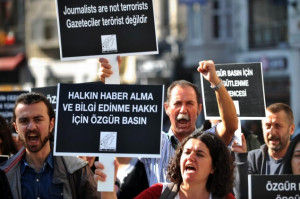
These arrests come hot on the heels of Turkey and Russia signing major energy and trade deals, at a time when relations between Russia and the U.S. are at their most strained for decades. If Turkey is truly moving closer to Moscow, the CIA will attempt to topple the government in Ankara and install a more subservient regime, just as the West is trying to force regime change in Russia through acts of economic warfare. Gulen and Erdoğan have been in a bitter dispute which was revealed to the public in December 2013, when corruption charges were launched against figures close to Erdoğan. The Turkish government immediately responded by removing dozens of senior police officers who were believed to be loyal to Gulen, with Erdoğan asserting they were complicit in trying to form a “state within a state”.
Gulen, a “CIA-Created Preacher”
Reports that Gulen is working with the CIA have been circulating for years, and in the memoirs of former Turkish Intelligence Chief Osman Nuri Gundes, he claims that the Gulen movement is a CIA cover for operations in Asia. Former FBI translator and whistleblower Sibel Edmonds documents in a January 2014 article titled: Turkish PM Erdoğan: The speedy transformation of an imperial puppet, the transformation in the manner Western media now presents Erdoğan’s government since his public split with Gulen in December 2013; from a model of democracy to a dictatorial regime. Edmonds pinpoints that the “rift” between the two men is the factor in these changing narratives in the Western media, and that Erdoğan didn’t just fall out with Gulen, but the CIA itself:
“The downfall of Turkey’s Erdoğan began with a rift between him and the CIA-Created Muslim Preacher Imam Fethullah Gulen…. Since 2009 I have been a lone voice in reporting, analyzing and exposing the Imam and his multi-billion dollar Islamic network and operations around the globe, fully orchestrated and backed by the Central Intelligence Agency-CIA…. For Erdoğan the rift with Imam Fethullah Gulen means a rift with the CIA. And we all know what happens to those puppets when they end up in a rift with the CIA.”
CIA and SIS orchestrated 1953 Iranian coup
Historically the CIA has used the media and the press to weaken regimes hostile to their interests and topple governments not subservient to their dictates. It was recently declassified (yet widely known for years), that the CIA along with the British Secret Intelligence Service (SIS) orchestrated the 1953 Iranian coup and ousted Mohammad Mossadegh, largely due to the Iranian leader nationalising Anglo-Iranian oil (the precursor to BP). The Western intelligence agencies conducted a propaganda campaign through the press and elements of the Tehran clergy to weaken Mossadegh’s government, install a new prime minister, and prop up the Shah of Iran.
Turkey’s political orientation is a difficult and complex one to ascertain, as many of its foreign policy stances are very close to Western powers yet it is not fully incorporated into the Western sphere of influence. Turkey has been a member of NATO since 1952 and is home to the second largest army in the alliance, yet it has been in negotiations to become a member of the European Union (EU) for close to a decade and applied for full membership of the union way back in 1987. Erdoğan has also signalled he wants Turkey to join the Shanghai Cooperation Organisation (SCO), an intergovernmental organisation comprised of Kazakhstan, China, Kyrgyzstan, Russia, Tajikistan and Uzbekistan, although some within the organisation view Turkey joining the SCO as a possible Western Trojan horse.
Turkey’s role in Syria
Turkey’s policy in Syria is deplorable in the eyes of many in the world, and they have been complicit in aiding the advancement of mercenaries who are attempting to overthrow the regime in Damascus, with an Islamic State fighter claiming Turkey “paved the way for us” to rise to such a level as today. Erdoğan has repeatedly called for regime change in Syria since 2011, a stance that differs from the Iranian and Russian positions on the matter. In a leaked audio tape in March, officials from the top echelons of the Turkish government were caught red handed discussing a false flag attack on their own territory, in order to justify a war with Syria. Featured on the tape was Ahmet Davutoglu, the Minister of Foreign Affairs at the time, who is now the Turkish Prime Minister. Erdoğan then moved to ban YouTube and Twitter to prevent the information circulating around Turkish society.
Some have asserted that this was leaked by supporters of CIA-linked Gulen, in order to demonise and undermine the government in Ankara. If true, this still doesn’t change the fact that high-level Turkish officials were planning a false flag attack to force regime change in Damascus, and then moved to shut down information platforms to stop the details spreading.
Turkish Prime Minister Davutoglu also revealed new security laws in October of this year, which criminalise protestors who are in possession of “weapons of violence” – such as Molotov cocktails and stones. The legislation also reportedly gives police more powers to search homes of demonstrators without “concrete evidence”, a worrying section of the bill that many view as Turkey’s descent into a police state.
We have to be careful not to allow governments to impede a free and open media under the auspices of national security, terrorism or any other pretext, as a free media is a prerequisite for a free society. Yet at the same time it is a documented fact that media outlets – including social media – can and have been used by foreign powers to subvert and overthrow regimes hostile to their interests.
Steven MacMillan is an independent writer, researcher, geopolitical analyst and editor of The Analyst Report, especially for the online magazine “New Eastern Outlook”.
